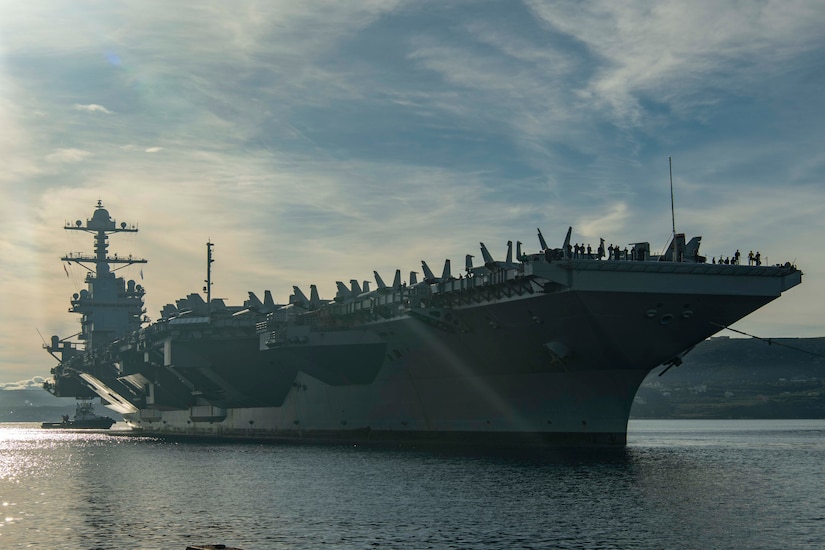This weekend, Secretary of Defense Lloyd J. Austin III embarks on a multiday trip to the Middle East with stops in Israel, Qatar and Bahrain. The trip also includes a visit to the USS Gerald R. Ford, which is underway now in the eastern Mediterranean Sea.
In Israel, Austin will underscore the unwavering U.S. commitment to Israel’s right to defend itself in accordance with international humanitarian law, and he will also discuss steps Israel is taking to mitigate civilian harm.
The secretary is also expected to discuss with Israeli military leaders what are to be the next steps in the conflict after an eventual cessation of high-intensity ground operations and airstrikes, said a senior defense official at the Pentagon today.
“[Secretary Austin] has been having discussions with his Israeli counterparts the entire time about the different phases of their campaign, how they assess the different phases of their campaign, and what their operational milestones are in order to feel that their population can be secure enough given their stated objective of the military dismantlement of Hamas,” the official said. “He wants to talk to them about how you move through those different phases.”
While the conflict between Israel and Hamas is an Israeli campaign and it will ultimately be Israeli’s decision on how to move to the next phase of operations, Austin is interested in learning more about their plans going forward, the official said.
“It’s for [Israel] to determine when they assess that Hamas has been sufficiently degraded [so] that they can shift to the next phase of their campaign,” the official said. “We, as the Department of Defense, and Secretary Austin in particular, I think, [have] incredibly valuable perspectives on this and that’s what he wants to consult with them about.”
In Bahrain, Austin is expected to visit U.S. Naval Forces Central Command. Part of the discussions there between the U.S. and Bahrain will involve U.S. efforts to convene multilateral coalitions to respond to aggression at sea that threatens shipping and the global economy.
“We will talk with them in a multinational framework about the work we’re doing, particularly in light of increasing Houthi aggression in the Red Sea,” the official said.
Since the Oct. 7 attack on Israel by Hamas, the official said Qatar has played a critical role in helping the U.S. communicate with Hamas. That effort was critical in securing the agreement for the release of some hostages. Qatar was also recently named a “major non-NATO ally” of the U.S. and plays host to U.S. forces at Al Udeid Air Base. The secretary will visit that installation.
“Secretary Austin will express our gratitude to Qatar’s national leaders for their partnership and their work with us on a range of regional and global objectives,” the official said. He will also discuss with Qataris the upgrades they’re investing in at Al Udeid.
Another part of this trip, the official said, is a visit to the Ford.
“Secretary Austin wants to visit with the troops on that carrier,” the official said. “They are missing the holidays with their families, and they have done an incredible service — not only for our country, but for the region.”
The Ford, like the USS Dwight D. Eisenhower, is in the Middle East now as part of the U.S. effort to make it clear that neither state or nonstate actors should hope to escalate the ongoing conflict beyond Gaza.
“What this visit to the Ford is about is an acknowledgment that we demonstrated what the National Defense Strategy means,” the official said. “The Department of Defense retains the capability to dynamically and expeditiously flow force into any theater in response to a crisis or contingency while maintaining our commitments in other theaters. And that is exactly what we’ve done.”









